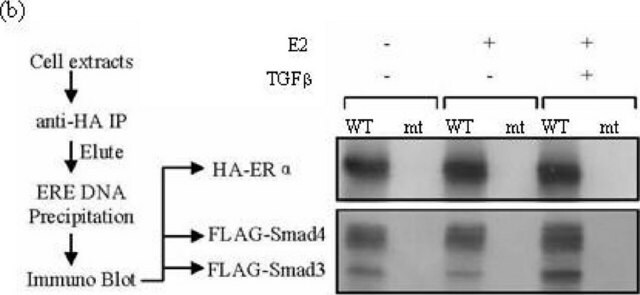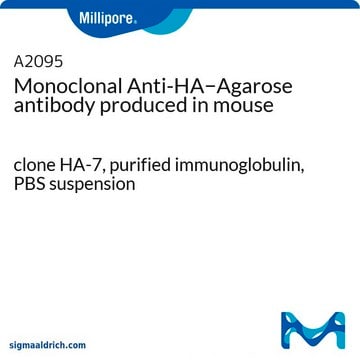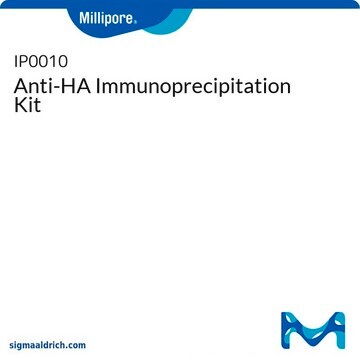12158167001
Roche
Anti-HA-Biotin, High Affinity (3F10)
from rat IgG1
Synonyma:
antibody
About This Item
Doporučené produkty
biological source
rat
Quality Level
conjugate
biotin conjugate
antibody form
purified immunoglobulin
antibody product type
primary antibodies
clone
3F10, monoclonal
form
lyophilized (stabilized)
packaging
pkg of 50 μg
manufacturer/tradename
Roche
isotype
IgG1
epitope sequence
YPYDVPDYA
storage temp.
2-8°C
Související kategorie
General description
Specificity
Immunogen
Application
- Dot blots
- ELISA (enzyme-linked immunosorbent assay)
- Western blots
It has also been used for immunocytochemistry, immunofluorescence and αScreen format based assay.
Quality
Preparation Note
Sample preparation: Prepare protein extracts containing the HA-tagged protein of interest using any of a variety of standard methods. The following lysis buffers have performed well and should be taken as guidelines:
- Bacterial extracts: 20 mM Tris, pH 8.0, 100 mM NaCl, cOmplete Protease Inhibitor Cocktail Tablets, followed by freeze-thaw.
- Mammalian extracts: 50 mM Tris, pH 7.5, 150 mM NaCl, 0.1% Nonidet P40, complete Protease Inhibitor Cocktail Tablets.
- Other cell lysis buffers may be more appropriate for individual applications. In general, to obtain optimal performance of the affinity matrix:
- Use protease inhibitors to reduce proteolytic activity. Use complete Protease Inhibitor Cocktail Tablets for most applications.
- Limit detergent to the lowest concentration levels necessary to obtain adequate cell lysis.
The following concentrations should be taken as a guideline:
- Dot blot: 100 ng/ml
- ELISA: 100 ng/ml
- Western blot: 100 ng/ml
Reconstitution
Rehydrate for 10 minutes prior to use.
Other Notes
Ještě jste nenalezli správný produkt?
Vyzkoušejte náš produkt Nástroj pro výběr produktů.
signalword
Warning
hcodes
Hazard Classifications
Aquatic Chronic 3 - Skin Sens. 1
Storage Class
11 - Combustible Solids
wgk_germany
WGK 2
flash_point_f
does not flash
flash_point_c
does not flash
Osvědčení o analýze (COA)
Vyhledejte osvědčení Osvědčení o analýze (COA) zadáním čísla šarže/dávky těchto produktů. Čísla šarže a dávky lze nalézt na štítku produktu za slovy „Lot“ nebo „Batch“.
Již tento produkt vlastníte?
Dokumenty související s produkty, které jste v minulosti zakoupili, byly za účelem usnadnění shromážděny ve vaší Knihovně dokumentů.
Zákazníci si také prohlíželi
Náš tým vědeckých pracovníků má zkušenosti ve všech oblastech výzkumu, včetně přírodních věd, materiálových věd, chemické syntézy, chromatografie, analytiky a mnoha dalších..
Obraťte se na technický servis.














